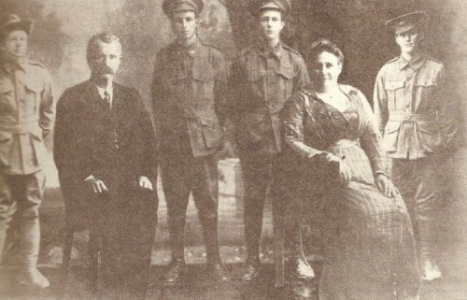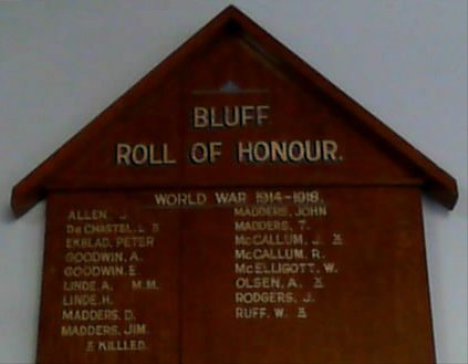John & Mary Madders with John, Dave, Tom & James Madders
Composite photo

Honour Board in the CWA Hall - Bluff
The board commemorates soldiers from the Bluff who served in
1914-1918 and 1939-1945
Photo courtesy Maxine Ohl

The Madders Family History
John Madders Snr was the head of a family of pioneering union activists in Queensland and the father of four sons who enlisted in the Tunnelling Companies; John, James, David and Thomas. He would become the father-in-law of another Tunnelling Company member, John Allan.
John Madders Snr was born in the village of South Zeal, Devon in July 1864, the twin son of an agricultural labourer and a domestic servant. By the age of 16, John Snr had left home to work as a coal miner at Ferndale in the Rhondda Valley, Wales. He married a local girl, Mary Jane Evans, at Pontypridd in Wales in December 1883.
Working conditions in Welsh coal mines in the latter half of the 19th century were notoriously poor. What John Snr saw and experienced in his years working at Ferndale would have shaped both his strongly held belief in the right of workers to safe and fair working conditions and his desire for a better life for his own family.
In pursuit of that better life, John and Mary Jane Madders, chose to immigrate to Queensland. Together with their infant son John, they sailed from Plymouth aboard the 'Scottish Hero' on 11 April 1886 bound for Maryborough. They travelled on a free passage as farm labourers. Within a day of the ship docking at Maryborough on 3 August 1886, John Snr had been engaged by James Robertson, a local coal mine owner, to work at his mine 'Top End' at Torbanlea, 25 km north-west of Maryborough. By February 1887, there were around 300 people living in Torbanlea, a township that at this time lacked any amenities other than a general store run by James Robertson. According to family tradition, the Madders first lived in a tin humpy and did all their cooking in an ant-bed oven.
Over the next 20 years, the Madders family grew to include a further six sons and six daughters; Sarah, Elizabeth, Mary, James, William, David, Thomas, Jessie, Rachel, Cecelia, Robert and George. During this time, the working and social life of the local community had come to be dominated by the Rankins, the family that would produce Dame Annabelle Rankin, the first woman from Queensland to sit in Federal Parliament. Dame Annabelle's grandfather, William Rankin had arrived in the district from Scotland in 1884 as manager of Queensland Collieries Company Limited. Members of his family would continue to hold this position for the next 55 years.
Of the three producing coal mines in the area; Burrum, Riverbank and Torbanlea, the Burrum Colliery run by Queensland Collieries Company Limited was by far the largest operation. The following description of local conditions from the Queensland Heritage Register listing for the Allan Slab Hut at Torbanlea is testament to the power the Rankin family exercised over the course of workers' lives at the time:
The managing Rankin family had instituted a rule of 'paternal despotism' and the fine house 'Brooklyn' that the company built for them in Howard stands in stark contrast to the hand-built timber hut of the Allan family. The Burrum miners were the last to be unionised in Queensland, conditions were notoriously bad and average wages were a shilling a day. Miners were paid by the ton, used pick and shovel and were never certain that they would have work the next day. Mining was the only local source of employment and the mine operators dictated the terms of employment. A small number of favoured permanent miners were provided with a miner's hut, a four-roomed stringybark cottage, of which there were fourteen in Torbanlea. Families had an average of eleven children and whilst most miners usually had only one meal a day, they endeavoured to provide two meals a day for their children.
During 1907-08, the Rankin family successfully resisted an attempt to unionise their operations. John Madders was involved in orchestrating this attempt and the subsequent victimisation of his family by the Rankins forced him to leave Torbanlea. He moved his family to the Bluff, west of Rockhampton, where he and his sons worked at the local colliery. There he became the prime mover behind the unionisation of the workforce and, following the successful establishment of a local union branch, he was elected chairman. The Madders family would spend the next 11 years at Bluff before moving back to settle at Torbanlea.
Following the outbreak of WW1, James was the first of the Madders sons to join the Australian Imperial Force. He enlisted at the Bluff in August 1915. He was followed into the Tunnelling Companies by David and Thomas in January 1916 and John in April 1916. All four sons survived to return to Australia though, like many, they suffered from the effects of their experiences.
Following his demobilisation, John Madders Jnr managed a grocery store in Robertson Street, Torbanlea for Burgowan Collieries Ltd. However, he was plagued by poor health as a result of being gassed in the war. He was eventually hospitalised in Rosemount Repatriation Hospital, Brisbane (now Greenslopes Private Hospital) and died there in June 1929.
James, David and Thomas Madders returned to their pre-war occupation as miners, all working initially in the Burrum / Torbanlea district. Both Thomas and David Madders were prominent in the local branch of the Miners' Union. Thomas was branch chairman for the area and, following a move to Ipswich, he became a member of the Queensland Miners Committee of Management. He was also Queensland correspondent for the Common Cause, the journal of what is now the CFMEU. In 1923, Thomas married Alice Lewis and they raised a family of three sons and three daughters.
David Madders held positions as local check inspector, scrutineer and committeeman for the Burgowan branch of the Miners' Union. He did not marry.
In 1920, James Madders married Emily Ruff and they raised a family of three sons at Torbanlea.
Sources:
1. The Madders Family History. Prepared in 1991 by members of the Madders family - Unpublished
2. Immigrant Agent's Shipping List at Maryborough.50megs.com
3. Howard State School website at www.howardss.eq.edu.au
4. Wikipedia entries for Dame Annabelle Rankin and Colin Dunlop Wilson Rankin
5. Queensland Government - Department of Environment and Resource Management - Queensland Heritage Register Listing # 601934 - Allan Slab Hut
6. Heroic Failure? Unionism and Queensland's Coal Communities, 1954-67. Bradley Bowen, Labour & Industry, April 2001.
7. A History of the Miners' Federation of Australia. Edgar Ross. Australasian Coal & Shale Employees' Federation, 1970.
The Capricornian - Rockhampton, Qld - Saturday 16 November 1918
Childrens Corner
“ Robert Madders, Bluff, writes:- 'Things look very dry up here just now. We have had no rain since the flood. There was a windstorm here to-night (November 3), but there was no rain with it. The creek has only a few muddy pools of water in it. Bushfires are raging with great force. They have burnt some of the grass about The Bluff. One night, they illuminated the place so much that we could see all over The Bluff. I have to cart water. I have a four-wheeled waggon, three goats, and a tank which holds fifty gallons of water. What do you think of the war news? I think it looks bright for our side. My mother had letters from my three brothers last week. They were all well when they wrote. They are together in a tunnelling company. They have been nearly three years in France, and we are thankful that they have not been sick or wounded. My brother Jack returned home last June medically unfit for service. He was two years away. He is getting on well now. There will be great rejoicing when peace is proclaimed. The 'march to freedom' boys are doing splendid work. If I were old enough I would go and help my brothers to fight for my country. Wishing you and the Corner every success. I am enclosing 2s. for the Children's Hospital Cot Fund’:- ‘I hope you will soon get rain, Robert. The war news is splendid. Perhaps you will have your brothers home sooner than you expect. They have been very fortunate, and I hope they will remain so to the end. Thank you for your donation to the Cot Fund.’ ”
Robert Would have been 13 years old at the time.
Submitted by Cathy Allan on behalf of the Madders family